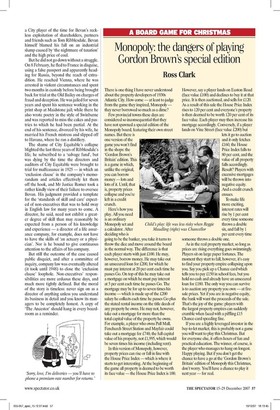Monopoly: the dangers of playing Gordon Brown's special edition
Ross Clark There is one thing I have never understood about the property developers of 1930s Atlantic City. How come — at least to judge from the game they inspired, Monopoly — they never borrowed so much as a dime?
Few provincial towns these days are considered so inconsequential that they have not spawned a special edition of the Monopoly board, featuring their own street names. But there is one version of the game you won't find in the shops: the 'Gordon Brown's Britain' edition. This is a game in which, unlike the original, you can borrow money — lots and lots of it. Until, that is, property prices collapse and you're left in a credit crunch.
Here's how you play. All you need is an ordinary Monopoly set and a calculator. After deciding who is going to be the banker, you take it turns to throw the dice and move around the board in the normal way. The difference is that each player starts with just £100. He may, however, borrow money. He may take out an unsecured loan for £200, for which he must pay interest at 20 per cent each time he passes Go. On top of this he may take out a mortgage on which he must pay interest at 5 per cent each time he passes Go. The mortgage may be for up to seven times his income —which is made up of the £200 salary he collects each time he passes Go plus the stated rental income on the title deeds of any property he owns. He may not, however, take out a mortgage for more than the total capital value of the property he owns. For example, a player who owns Pall Mall, Fenchurch Street Station and Mayfair could take out a mortgage for £740, the full capital value of his property, not £1,995, which would be seven times his income (including rent).
In this version of Monopoly, however, property prices can rise or fall in line with the House Price Index —which is where it starts to get interesting. At the beginning of the game all property is deemed to be worth its face value — the House Price Index is 100.
However, say a player lands on Euston Road (face value £100) and declines to buy it at that price. It is then auctioned, and sells for £120. As a result of this sale the House Price Index rises to 120 per cent and everyone's property is then deemed to be worth 120 per cent of its face value. Each player may then increase his mortgage accordingly. Conversely, if a player lands on Vine Street (face value £200) but lets it go to auction and it only fetches £160, the House Price Index falls to 80 per cent, and the value of all property falls accordingly. Result? Players with excessive mortgages will be thrown into negative equity. And a credit crunch ensues.
To make life more exciting, interest rates will rise by 1 per cent every time someone throws a double six, and fall by 1 per cent every time someone throws a double one.
As in the real property market, so long as prices are rising everything goes swimmingly. Players sit on large paper fortunes. The moment they start to fall, however, it's easy to find your property empire collapsing upon you. Say you pick up a Chance card which tells you to pay £150 in school fees, but you hold no cash and already have an unsecured loan for £180. The only way you can survive is to auction any property you own — at firesale prices. Yet if you are in negative equity, the bank will want the proceeds of the sale. That's the joy of the game: players with the largest property empires can suddenly crumble when faced with a piffling £15 Chance-card speeding fine.
If you are a highly leveraged investor in the buy-to-let market, this is probably not a game you will want to play this Christmas. But for everyone else, it offers hours of fun and practical education. The winner, of course, is the player who manages to hang on longest. Happy playing. But if you don't get the chance to have a go at the 'Gordon Brown's Britain' edition of Monopoly this Christmas, don't worry. You'll have a chance to play it next year — for real.

































































































 Previous page
Previous page